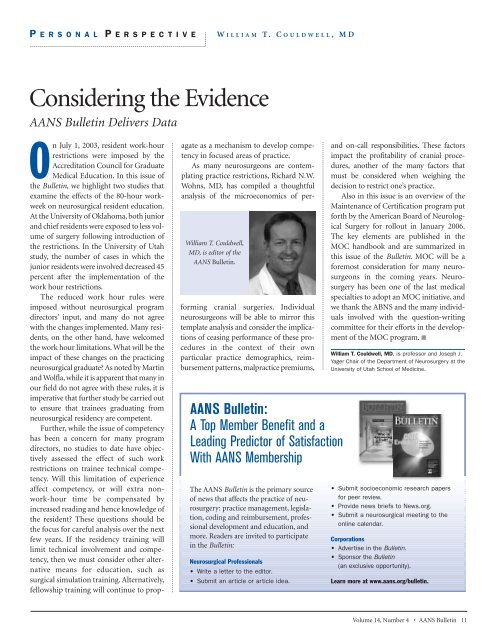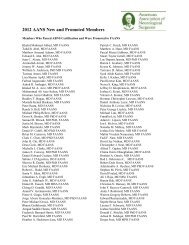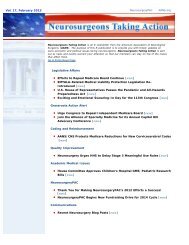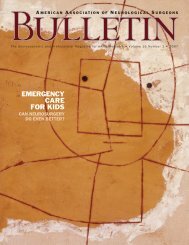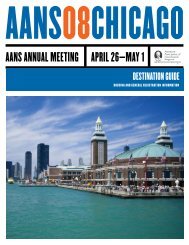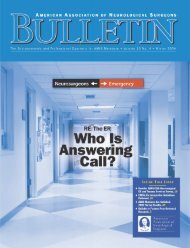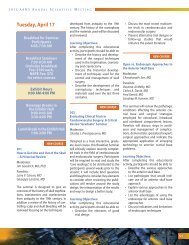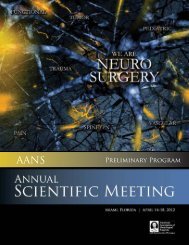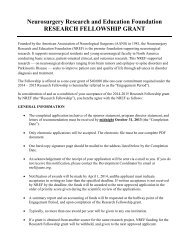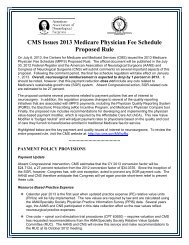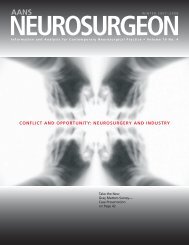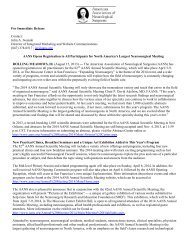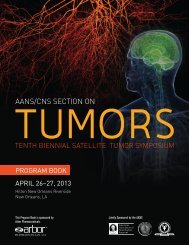view PDF - American Association of Neurological Surgeons
view PDF - American Association of Neurological Surgeons
view PDF - American Association of Neurological Surgeons
You also want an ePaper? Increase the reach of your titles
YUMPU automatically turns print PDFs into web optimized ePapers that Google loves.
P ERSONAL P ERSPECTIVE<br />
W ILLIAM T .<br />
C OULDWELL, MD<br />
Considering the Evidence<br />
AANS Bulletin Delivers Data<br />
On July 1, 2003, resident work-hour<br />
restrictions were imposed by the<br />
Accreditation Council for Graduate<br />
Medical Education. In this issue <strong>of</strong><br />
the Bulletin, we highlight two studies that<br />
examine the effects <strong>of</strong> the 80-hour workweek<br />
on neurosurgical resident education.<br />
At the University <strong>of</strong> Oklahoma, both junior<br />
and chief residents were exposed to less volume<br />
<strong>of</strong> surgery following introduction <strong>of</strong><br />
the restrictions. In the University <strong>of</strong> Utah<br />
study, the number <strong>of</strong> cases in which the<br />
junior residents were involved decreased 45<br />
percent after the implementation <strong>of</strong> the<br />
work hour restrictions.<br />
The reduced work hour rules were<br />
imposed without neurosurgical program<br />
directors’ input, and many do not agree<br />
with the changes implemented. Many residents,<br />
on the other hand, have welcomed<br />
the work hour limitations. What will be the<br />
impact <strong>of</strong> these changes on the practicing<br />
neurosurgical graduate As noted by Martin<br />
and Wolfla, while it is apparent that many in<br />
our field do not agree with these rules, it is<br />
imperative that further study be carried out<br />
to ensure that trainees graduating from<br />
neurosurgical residency are competent.<br />
Further, while the issue <strong>of</strong> competency<br />
has been a concern for many program<br />
directors, no studies to date have objectively<br />
assessed the effect <strong>of</strong> such work<br />
restrictions on trainee technical competency.<br />
Will this limitation <strong>of</strong> experience<br />
affect competency, or will extra nonwork-hour<br />
time be compensated by<br />
increased reading and hence knowledge <strong>of</strong><br />
the resident These questions should be<br />
the focus for careful analysis over the next<br />
few years. If the residency training will<br />
limit technical involvement and competency,<br />
then we must consider other alternative<br />
means for education, such as<br />
surgical simulation training. Alternatively,<br />
fellowship training will continue to propagate<br />
as a mechanism to develop competency<br />
in focused areas <strong>of</strong> practice.<br />
As many neurosurgeons are contemplating<br />
practice restrictions, Richard N.W.<br />
Wohns, MD, has compiled a thoughtful<br />
analysis <strong>of</strong> the microeconomics <strong>of</strong> per-<br />
William T. Couldwell,<br />
MD, is editor <strong>of</strong> the<br />
AANS Bulletin.<br />
forming cranial surgeries. Individual<br />
neurosurgeons will be able to mirror this<br />
template analysis and consider the implications<br />
<strong>of</strong> ceasing performance <strong>of</strong> these procedures<br />
in the context <strong>of</strong> their own<br />
particular practice demographics, reimbursement<br />
patterns, malpractice premiums,<br />
AANS Bulletin:<br />
A Top Member Benefit and a<br />
Leading Predictor <strong>of</strong> Satisfaction<br />
With AANS Membership<br />
The AANS Bulletin is the primary source<br />
<strong>of</strong> news that affects the practice <strong>of</strong> neurosurgery:<br />
practice management, legislation,<br />
coding and reimbursement, pr<strong>of</strong>essional<br />
development and education, and<br />
more. Readers are invited to participate<br />
in the Bulletin:<br />
Neurosurgical Pr<strong>of</strong>essionals<br />
• Write a letter to the editor.<br />
• Submit an article or article idea.<br />
and on-call responsibilities. These factors<br />
impact the pr<strong>of</strong>itability <strong>of</strong> cranial procedures,<br />
another <strong>of</strong> the many factors that<br />
must be considered when weighing the<br />
decision to restrict one’s practice.<br />
Also in this issue is an over<strong>view</strong> <strong>of</strong> the<br />
Maintenance <strong>of</strong> Certification program put<br />
forth by the <strong>American</strong> Board <strong>of</strong> <strong>Neurological</strong><br />
Surgery for rollout in January 2006.<br />
The key elements are published in the<br />
MOC handbook and are summarized in<br />
this issue <strong>of</strong> the Bulletin. MOC will be a<br />
foremost consideration for many neurosurgeons<br />
in the coming years. Neurosurgery<br />
has been one <strong>of</strong> the last medical<br />
specialties to adopt an MOC initiative, and<br />
we thank the ABNS and the many individuals<br />
involved with the question-writing<br />
committee for their efforts in the development<br />
<strong>of</strong> the MOC program. 3<br />
William T. Couldwell, MD, is pr<strong>of</strong>essor and Joseph J.<br />
Yager Chair <strong>of</strong> the Department <strong>of</strong> Neurosurgery at the<br />
University <strong>of</strong> Utah School <strong>of</strong> Medicine.<br />
• Submit socioeconomic research papers<br />
for peer re<strong>view</strong>.<br />
• Provide news briefs to News.org.<br />
• Submit a neurosurgical meeting to the<br />
online calendar.<br />
Corporations<br />
• Advertise in the Bulletin.<br />
• Sponsor the Bulletin<br />
(an exclusive opportunity).<br />
Learn more at www.aans.org/bulletin.<br />
Volume 14, Number 4 • AANS Bulletin 11


